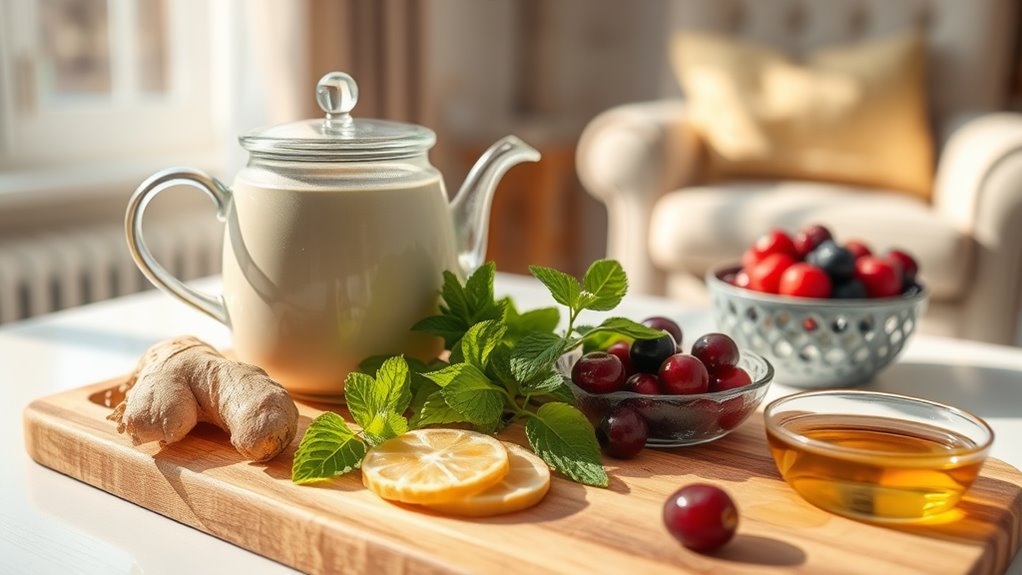Heart Palpitations. These 6 Home Remedies Will Calm Your Heart Instantly!
If you’re feeling heart palpitations, you can quickly calm yourself with these six home remedies. Try deep breathing exercises to engage relaxation. Staying hydrated with water and electrolyte-rich drinks helps too. Herbal teas like chamomile or ginger soothe your heart and mind. Don’t forget magnesium-rich foods, such as spinach and almonds, for added support. Lastly, mindfulness and gentle physical activity can alleviate stress. Discover more ways to support your heart health!
Deep Breathing Exercises
When you feel your heart racing, deep breathing exercises can help calm your mind and body. By focusing on your breath, you engage your parasympathetic nervous system, promoting relaxation.
Start by inhaling deeply through your nose for a count of four, holding for four, then exhaling slowly through your mouth for another four counts. Repeat this cycle several times. This technique not only reduces anxiety but also provides fast heart palpitation relief.
As you practice, ensure you’re in a quiet space, free from distractions. With consistent practice, you’ll master these exercises, allowing you to manage heart palpitations more effectively.
Stay Hydrated
Staying hydrated is essential for overall health and can play a significant role in managing heart palpitations. When you’re properly hydrated, your heart functions more efficiently, reducing unnecessary stress on your cardiovascular system.
Here are three hydration tips to help you master your heart health:
-
Drink Water Regularly: Aim for at least 8 glasses a day, adjusting for activity levels.
-
Include Electrolyte-Rich Drinks: Coconut water or electrolyte-infused beverages can replenish essential minerals lost through sweat.
-
Eat Hydrating Foods: Incorporate fruits and vegetables like cucumbers and watermelon, which provide both hydration and nutrients.
Herbal Teas for Relaxation
Hydration isn’t just about water; the beverages you choose can also impact your heart health. Herbal teas, in particular, offer soothing properties that can help calm your heart during stressful moments.
Chamomile tea is renowned for its tranquility, while valerian root can promote relaxation and reduce anxiety. Consider sipping on lemon balm tea to ease tension and enhance your mood.
Another excellent choice is passionflower, which has calming effects that can support heart rhythm. Ginger tea not only aids digestion but can also alleviate stress, contributing to a more stable heartbeat.
Magnesium-Rich Foods
Magnesium plays a crucial role in heart health, and incorporating magnesium-rich foods into your diet can help manage heart palpitations.
By nourishing your body with these foods, you can support your heart’s function and reduce anxiety levels.
Here are three powerful magnesium-rich foods you should consider:
-
Spinach: This leafy green is packed with magnesium, helping to relax your muscles and calm your heart.
-
Almonds: A handful of almonds not only satisfies your snack cravings but also provides a significant magnesium boost.
-
Black Beans: These legumes are versatile and nutrient-dense, making them an excellent addition to any meal while enhancing your magnesium intake.
Mindfulness and Meditation
Mindfulness and meditation offer a pathway to inner peace, helping you manage heart palpitations by reducing stress and anxiety. By focusing your attention and cultivating awareness, you can train your mind to respond calmly to triggers.
Start by setting aside just a few minutes each day for deep breathing and silent reflection. As you inhale, visualize serenity entering your body, and as you exhale, release tension and unease.
Incorporate guided meditations that specifically address anxiety and heart health. This practice not only strengthens your mental resilience but also enhances your ability to regulate your heart’s rhythm.
With consistent practice, you’ll find a profound sense of control over your emotions, ultimately fostering a calmer heart and a more balanced life.
Gentle Physical Activity
After cultivating a calm mind through mindfulness and meditation, incorporating gentle physical activity can further support your heart health.
Engaging in movement doesn’t have to be intense; it can be soothing and restorative. Here are three gentle activities you can embrace:
-
Walking: A leisurely stroll in nature can ground you, allowing your heart rate to stabilize while you connect with your surroundings.
-
Yoga: Practicing gentle yoga promotes relaxation and flexibility, helping to release tension and improve circulation.
-
Tai Chi: This slow, flowing exercise combines movement and breath, offering a meditative quality that calms the heart.
Frequently Asked Questions
Can Heart Palpitations Be a Sign of a Serious Condition?
Yes, heart palpitations can indicate serious conditions, like arrhythmias or heart disease. If you experience them frequently or alongside other symptoms, you should consult a healthcare professional to evaluate your specific situation and determine appropriate actions.
How Long Do Heart Palpitations Usually Last?
Typically, they last just a few seconds to a couple of minutes. However, if you notice they persist longer or occur frequently, it’s essential to consult a healthcare professional for further evaluation and guidance.
Are There Specific Triggers for Heart Palpitations?
Certain factors can trigger your heart to race, like stress, caffeine, or intense exercise. You can identify your unique triggers by keeping a journal, helping you manage your reactions effectively and maintain better control over your heart’s rhythm.
When Should I Consult a Doctor About My Palpitations?
If you experience frequent or severe palpitations, or if they’re accompanied by dizziness, shortness of breath, or chest pain, you should consult a doctor. It’s vital to rule out any underlying health issues.
Can Stress Worsen Heart Palpitations?
Yes, stress can definitely worsen your heart’s rhythm. When you’re anxious or overwhelmed, your body releases hormones that can increase your heart rate. Managing stress through relaxation techniques can help maintain a steadier heartbeat.
